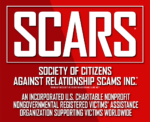SCARS™ Psychology Of Scams: Chasing Your Money – A Psychological Trap
Don’t Get Caught Chasing The Money – That Path Can Lead To Addiction
A specific form of self-entrapment that some romance scam victims struggle with is the urge to chase their losses. This is a syndrome very common to gamblers too!
Chasing losses simply mean trying to win back the money you’ve already lost by gambling more. In the case of romance scam victims, it means not giving up on the fake relationship and even sending more money because of the fear of total loss – loss of the relationship and loss of the money already sent. This is especially prevalent after large amounts of money have been sent.
The Deeper The Hole The More You Want To Dig!
Unfortunately, chasing usually results in only one thing: more losses – which can then lead to more chasing – creating a vicious cycle that can be difficult to break.
Research to date shows that pathologically gamblers and drug addicts, and we believe romance scam victims also share many of the same genetic predispositions for impulsivity and reward seeking.
Just as substance addicts require increasingly strong hits to get high, compulsive romance scam victims pursue ever riskier ventures. Likewise, both drug addicts and problem victim endure symptoms of withdrawal when separated from the chemical or thrill they desire – namely the fake romantic relationship. And a few studies suggest that some people are especially vulnerable to both drug addiction and compulsive scamming because their reward circuitry is inherently underactive—which may partially explain why they succumb to scam in the first place.
Even more compelling, neuroscientists the romance scams and gambling alter many of the same brain circuits in similar ways. These insights come from studies of blood flow and electrical activity in people’s brains as they complete various tasks on computers that either mimic casino games or test their impulse control – unfortunately, no studies are yet available that tested romance scam victims in similar ways – but it is believed the scam and gambling produce the same results in the brain.
Romance Scams May Be As Powerfully Addictogenic As Gambling!
When we look at the behavior of romance scam victims we see strong parallels with addicted gamblers, and applying gambling addition to romance scam victims provides a template to better understand the victims’ behaviors during the scam. Ironically, the addiction (mostly) ends with the discovery of the scam. However, just like with addicted gamblers, scam many victims return to searching for their next “high” by going right back out and exposing themselves to the next scammer.
To learn about this is first hand – listen to a victim describe this in her own words »
We welcome your comments and insights into this subject and hope that you will share your own experiences to help others!

SCARS™ Team
A SCARS Division
Miami Florida U.S.A.
Please Note: the purpose of our articles on the Psychology of Scam is not to present scientific papers but to help scam victims both understand their experiences and to provide a framework to discuss these issues with their counselors or therapists. This information is presented for education and entertainment purposes only. All psychological diagnosis should always be performed by a licensed mental health professional.
TAGS: Psycholog of Scams, Addictogenic, Gambling, Addiction, Addicted, Romance Scam, Scam Victim, Chasing Money, Scam Losses, Victim Behavior,
END
– – –
Tell us about your experiences with Romance Scammers in our Scams Discussion Forum on Facebook »
– – –
FAQ: How Do You Properly Report Scammers?
It is essential that law enforcement knows about scams & scammers, even though there is nothing (in most cases) that they can do.
Always report scams involving money lost or where you received money to:
- Local Police – ask them to take an “informational” police report – say you need it for your insurance
- Your National Police or FBI (www.IC3.gov)
- The SCARS|CDN™ Cybercriminal Data Network – Worldwide Reporting Network HERE or on www.Anyscam.com
This helps your government understand the problem, and allows law enforcement to add scammers on watch lists worldwide.
– – –
Visit our NEW Main SCARS Facebook page for much more information about scams and online crime: www.facebook.com/SCARS.News.And.Information
To learn more about SCARS visit www.AgainstScams.org
Please be sure to report all scammers HERE or on www.Anyscam.com
All original content is Copyright © 1991 – 2018 SCARS All Rights Reserved Worldwide & Webwide – RSN/Romance Scams Now & SCARS/Society of Citizens Against Relationship Scams are all trademarks of Society of Citizens Against Relationship Scams Incorporated (formerly the Society of Citizens Against Romance Scams)
Legal Notices:
All original content is Copyright © 1991 – 2018 SCARS All Rights Reserved Worldwide & Webwide. Third-party copyrights acknowledge.
SCARS, RSN, Romance Scams Now, SCARS|GLOBAL, SCARS, Society of Citizens Against Relationship Scams, Society of Citizens Against Romance Scams, SCARS|ANYSCAM, Project Anyscam, Anyscam, SCARS|GOFCH, GOFCH, SCARS|CHINA, SCARS|CDN, SCARS Cybercriminal Data Network, Cobalt Alert, Scam Victims Support Group, are all trademarks of Society of Citizens Against Relationship Scams Incorporated.
Contact the law firm for the Society of Citizens Against Relationship Scams Incorporated by email at legal@AgainstScams.org





Leave A Comment